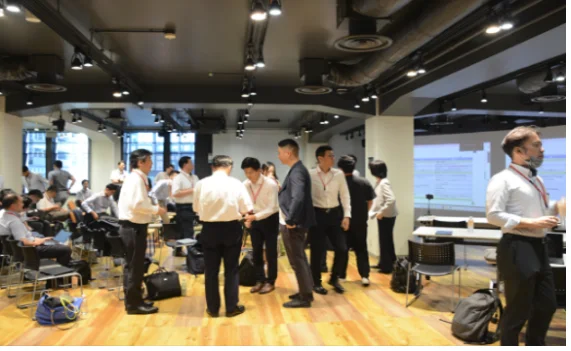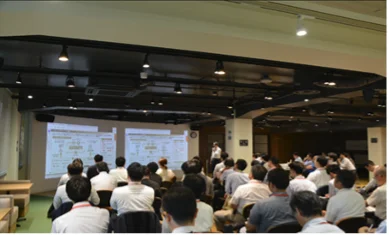~Future Developments Include Expanding Participating Companies and Formulating Guidelines for Insetting~
Green Carbon Inc. (CEO: Jun Okita; “Green Carbon”), a company that develops and sells nature-based carbon credits, has officially joined the “Insetting Consortium” (the “Consortium”) hosted by The Norinchukin Bank (President and CEO: Taro Kitabayashi). Green Carbon will actively communicate its initiatives to contribute to the reduction of corporate Scope 3 emissions.
The Consortium was established in August 2024 to facilitate the transition toward carbon neutrality and nature-positivity within the food and agriculture value chain (the “Food and Agri VC”). It has been strengthening collaboration between GHG (Greenhouse Gas) reduction solution providers and companies within the Food and Agri VC. We are pleased to announce that the first meeting for full-scale operation was held in July, and in conjunction with this, 16 new companies, including Green Carbon, have joined the Consortium.
〇Link to The Norinchukin Bank’s press release
◆Trends Surrounding Insetting
Insetting is a concept where a company invests in or provides support within its own value chain (VC) to reduce its indirect GHG emissions (Scope 3). The goal is to generate environmental value, such as GHG reductions, across the entire VC and promote a transition to being nature-positive.
As reducing Scope 3 emissions requires collaboration not only within a company but also with a wide range of stakeholders across its VC, the concept of insetting is gaining attention, and discussions for its implementation are advancing within international standards for carbon accounting. However, in Japan, the concept of insetting has not yet fully penetrated the market. For food and agriculture-related companies, such as food manufacturers and retailers whose supply chains include agriculture, forestry, and fisheries, implementing insetting is crucial to meet demands for GHG reductions and reduced environmental impact in agricultural production. Yet, due to challenges like a lack of traceability, efforts by these companies to understand farmers’ production conditions and build relationships for investment and support have not expanded sufficiently. Recognizing this situation, The Norinchukin Bank established this Consortium last year and has been promoting discussions with participating companies.
To promote insetting in the Food and Agri VC, it is vital to create a mechanism where a wide range of stakeholders can collaborate to consider and support the adoption and dissemination of farming methods, technologies, and materials that contribute to decarbonization and nature-positivity at the production level.
The Consortium, founded on the principle of fostering collaboration among these stakeholders, will further strengthen this cooperation by welcoming new member companies and technical partners. Furthermore, for insetting to serve as a reliable incentive for companies, it is necessary that investments and support for decarbonization and nature-positivity in the VC actually lead to Scope 3 reductions and are recognized under international standards. The Consortium will keep up with international discussions on carbon accounting, including insetting, and will proceed with developing domestic guidelines for insetting standards to ensure that their application aligns with the realities of domestic production sites and the business practices of food and agriculture-related companies.
-1024x576.png)
〇Consortium Overview
◆Background for Joining the Consortium
Green Carbon joined the Consortium with the desire to be at the forefront of expanding initiatives to address Scope 3 emission reductions, an area we believe will become increasingly important. We consider it our social responsibility and a key to strengthening our corporate competitiveness to be an early implementer of effective measures for reducing environmental impact, preparing for an era of increasing regulation.
Through the Consortium, we will also strive to increase the added value for producers, contributing to the development of sustainable agriculture and distribution. We have already initiated concrete collaborations with several companies and have begun pilot projects.
Furthermore, we plan to functionally integrate these efforts into our service, “Agreen,” to build a system that ensures traceability. Through this, we will develop a new platform that achieves both environmental load reduction and value creation.
Going forward, we plan to expand these initiatives both domestically and internationally, accelerating our contribution to addressing the global challenges of climate change and sustainable food supply.
◆About the First General Meeting
The first general meeting was held in July with the participation of all Consortium members. In addition to a report on the direction of our efforts, the meeting featured keynote speeches on decarbonization in the agricultural sector, policy trends, and international trends in insetting. There was also a pitch session where solution companies introduced their technologies. Active networking among members made it a valuable opportunity to strengthen collaboration.
【Keynote Speakers】
・Mr. Sudo, National Agriculture and Food Research Organization (NARO) (participated online)
・Mr. Origuchi, Deputy Director, Environmental Economy Office, GX Group, Ministry of Economy, Trade and Industry (METI) (position as of July 2025)

〇Image of the networking session

〇Image of the venue
◆Consortium Members
◆Founding Members:
- Skylark Holdings Co., Ltd. (President & CEO: Minoru Kanaya)
- Nichirei Foods Inc. (President & CEO: Masahiko Takenaga)
- TOWING Inc. (CEO: Kohei Nishida)
◆New Members:
- SDS Biotech K.K. (President & CEO: Masatoshi Takeda)
- KAGOME CO., LTD. (President & CEO: Satoshi Yamaguchi)
- Kanematsu Corporation (President: Yoshiya Miyabe)
- Kikkoman Corporation (President & CEO: Shozaburo Nakano)
- Kuon Crop Inc. (Representative Director: Taku Kitagaki)
- Suntory Holdings Limited (President & CEO: Nobuhiro Torii)
- Starzen Company Limited (President and CEO: Kazuhiko Yokota)
- National Federation of Agricultural Co-operative Associations (ZEN-NOH) (President: Yoshifumi Kuwata)
- NISSIN FOODS HOLDINGS CO., LTD. (Representative Director, President & CEO: Koki Ando)
- BIOCELLAR Inc. (Representative Director: Ryohei Kono)
- FamilyMart Co., Ltd. (President: Kensuke Hosomi)
- Faeger Co., Ltd. (Representative Director: Takahiro Ishizaki)
- Meiji Holdings Co., Ltd. (Representative Director, President: Katsuya Matsuda)
- Morinaga Milk Industry Co., Ltd. (Representative Director, President: Yoichi Onuki)
- DSM Japan K.K. (Representative Director, President: Kazunori Maruyama)
- Green Carbon Inc. (CEO: Jun Okita)
◆Technical Partner:
- National Agriculture and Food Research Organization (NARO) (President: Kazuo Kuma)
◆ Green Carbon Inc.
Representative: Jun Okita, CEO
Head Office: PREX North 9F, 2-3-2 Kojimachi, Chiyoda-ku, Tokyo, Japan
Established: December 2019
Business Activities: Development and sales of carbon credits, agriculture-related projects, environmental projects, other related businesses, and ESG consulting
Website: https://green-carbon.co.jp/en/
◆ About Green Carbon
Guided by the vision of “Harnessing the power of life to save the Earth,” Green Carbon develops and supports projects that generate, register, and sell nature-based carbon credits both in Japan and abroad. The company is also engaged in agriculture-related businesses, R&D initiatives, and ESG consulting.
Its business activities span Japan, Southeast Asia, Australia, and South America, creating credits from rice paddies, biochar, forest conservation, carbon farming, mangrove planting, and cattle methane reduction. In Japan, Green Carbon obtained certification in FY2023 for the country’s first and one of the largest-scale rice paddy J-Credit projects (approx. 6,220 t). In FY2024, the company plans to expand this initiative to around 40,000 ha (approx. 80,000 t).
Green Carbon also provides “Agreen,” a one-stop platform service that streamlines the entire process of credit registration, application, and sales. By simplifying procedures and documentation, the service reduces the administrative burden on credit creators.

